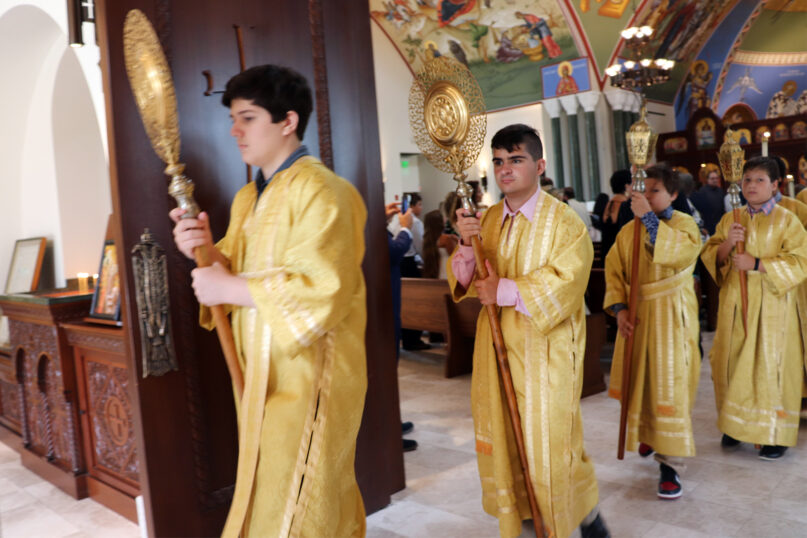SOUTHAMPTON, New York (RNS) — Dressed in the yellow robes of an altar server, Dimitri Donus dutifully held the tall, golden sacramental fan as he processed with other acolytes during the Divine Liturgy on a recent Sunday at his Greek Orthodox church in this resort town on Long Island’s east end.
Later, he joined other church members for a meal, munching on fried chicken, corn on the cob and cornbread. Then, along with his housemates and their caregivers, he traveled a half-hour by van and set out on a small boat for an afternoon sail.
Donus is one of a handful of residents of a house run by US Autism Homes for young adults with autism through a private-public partnership involving the Dormition of the Virgin Mary Greek Orthodox Church of the Hamptons. At the 5,000-square-foot house a six-minute walk from the church, he has a place to live and an extended circle of friends beyond his immediate family.
“For breakfast, I ate eggs and English muffins and bacon,” said Donus, 20, quickly ticking off the foods he enjoys, especially one: “Blueberries, 160 days in a row.”
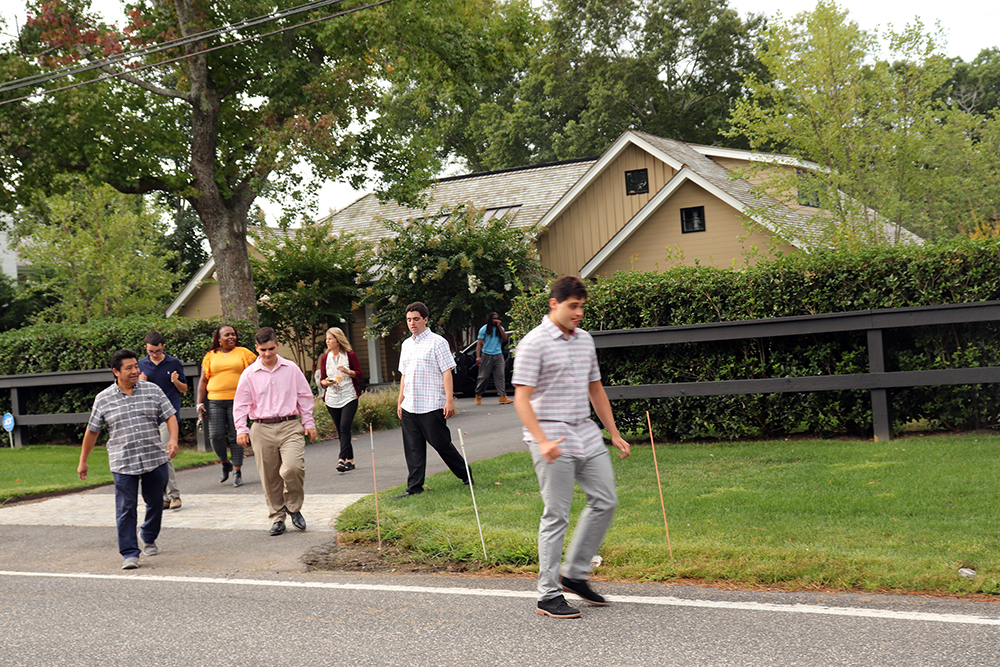
Residents and caregivers walk from a US Autism Homes location to Dormition of the Virgin Mary Greek Orthodox Church of the Hamptons in Southampton, New York, on Sept. 11, 2022. RNS photo by Adelle M. Banks
His mother, Melanie Donus, a member of the church, gratefully points out that her son never ate fruits and vegetables when he lived with his family.
RELATED: RNS Series: Disability and Faith: How Religious Groups Are Combating Ableism
His independence has brought changes big and small to the lives of her son and his three housemates since 2020, when they slowly transitioned from their parents’ homes to share space together in the house outfitted for them.
The arrangement is the inspiration of Dr. Lisa Liberatore, who left her Manhattan ear, nose and throat medical practice to devote herself full time to US Autism Homes and a second nonprofit focused on autistic adults. In 2015, Liberatore and her husband, Dr. Dimitri Kessaris, a urologist, founded Luv Michael, a granola company named for their son and co-founder Michael Kessaris, now 24, who is autistic.
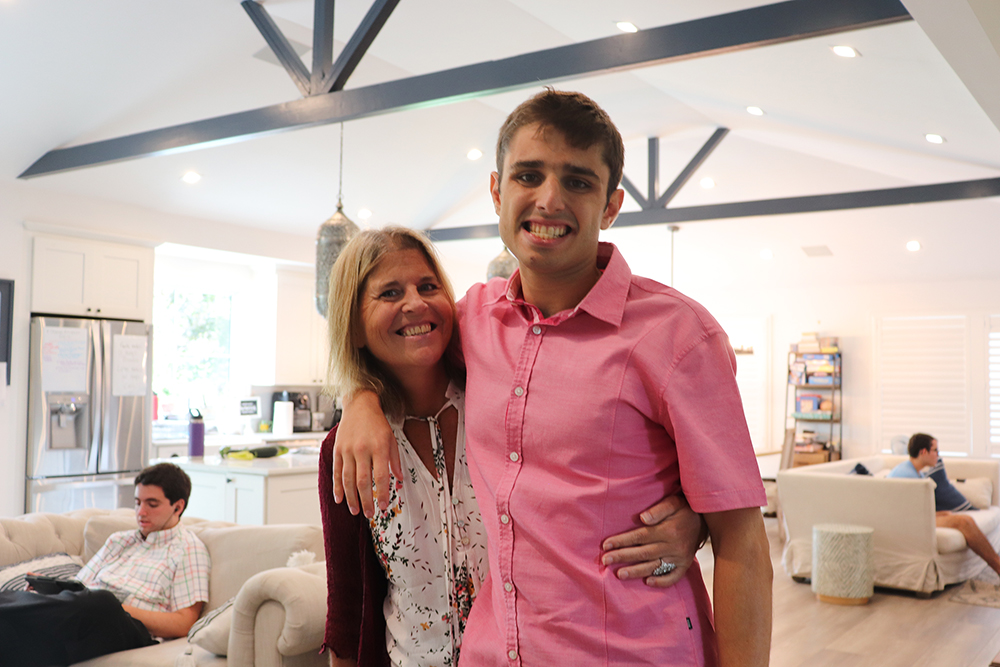
Behavioralist Tracey Glander, left, and resident Michael Kessaris at a US Autism Homes location in Southampton, New York, on Sept. 11, 2022. RNS photo by Adelle M. Banks
As Michael grew toward adulthood, the question of housing loomed for their family.
“Seventeen years old is when I had the epiphany,” said Liberatore.
“I realized that the school wasn’t really planning for what was going to happen when he aged out at 21,” she recalled. “They had no plan for transitioning to adulthood and that we were going to have to figure this out ourselves.”
US Autism Homes became her answer, with a three-pronged goal to provide a less-isolated existence for adults with autism, programs during the week to teach art, dance and academics, and an opportunity for spiritual connection and instruction in which Orthodox Christians and non-Orthodox Christians participate.
“The religious component has given him a sense of community that I never dreamt for my child,” said Melanie Donus, whose two children besides Dimitri are also autistic.
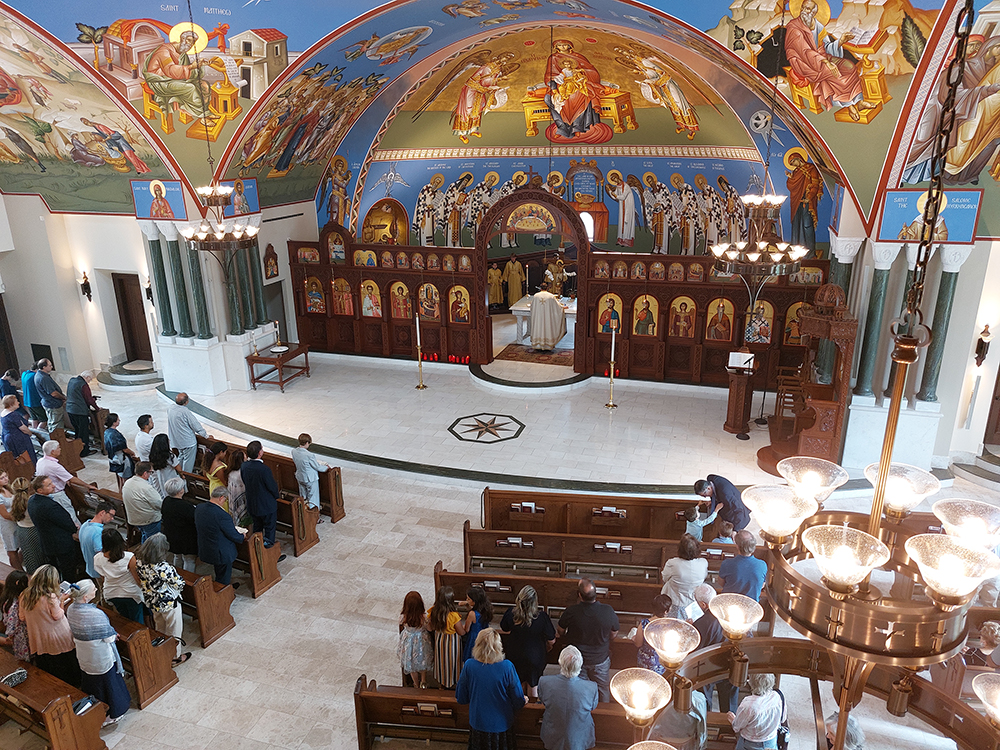
People attend a service at Dormition of the Virgin Mary Greek Orthodox Church of the Hamptons in Southampton, New York, on Sept. 11, 2022. RNS photo by Adelle M. Banks
The priests at the Dormition of the Virgin Mary church, the Revs. Alexander Karloutsos and Constantine Lazarakis, took time to hold special liturgical lessons to explain the faith at a pace Donus and his housemates could grasp.
“He not only didn’t know how to cross himself, but he didn’t know why he was doing that. He didn’t know who Jesus was,” said his mother, a convert to Greek Orthodoxy from Protestantism. “He knows all of that now, and he knows the importance of our faith.”
Rose Giangiobbe said she’s comfortable with her son, Anthony, 31, joining the community even though their family is Catholic. He is preparing to live in a second house US Autism Homes began opening in mid-September that is a six-mile drive from the church.
“Anthony is very open to new ideas, new experiences,” she said. “He really took a liking to what he saw here and is willing to participate.”
The residence program, which includes care managers and other advocates, is funded by Medicaid under “self-directed services,” with a local nonprofit, East End Disability Associates, acting as a fiscal intermediary for the residents. The four residents’ budget totals about $520,000 in rent, utilities and contributions toward paying a cook, a housekeeper and direct support professionals.
Liberatore and Kessaris bought and renovated both of US Autism Homes’ houses through a limited liability corporation and rent them to US Autism Homes in long-term agreements. The residents in turn sublet the furnished homes. Each resident has their own room and shares communal space — including computers, exercise equipment and a swimming pool.
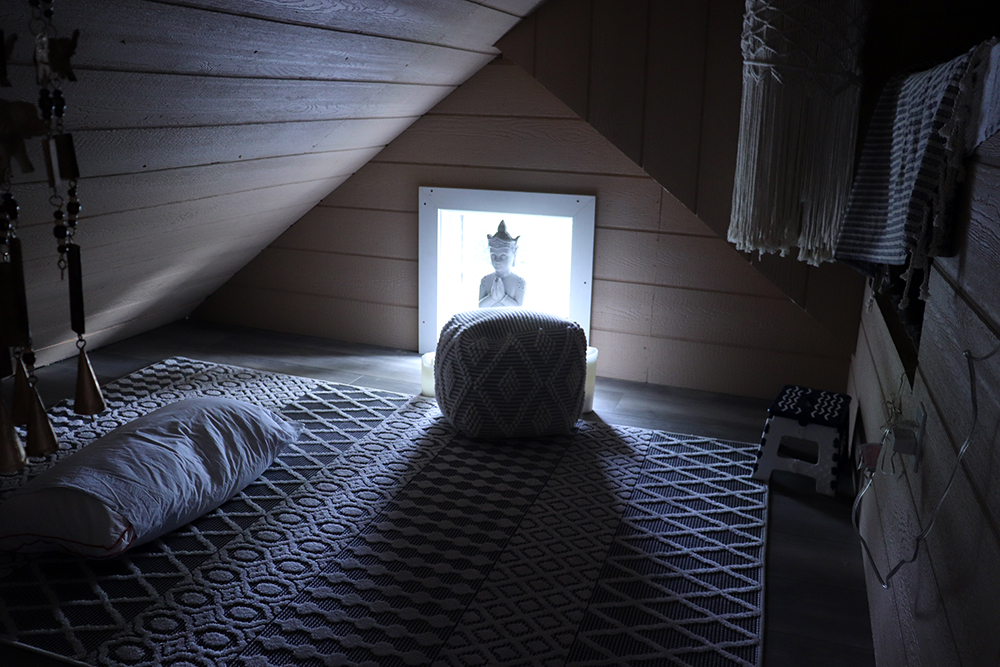
A relaxation room at the US Autism Homes location in Southampton, New York, on Sept. 11, 2022. RNS photo by Adelle M. Banks
There’s also a small movie theater where housemate Christian Ciardello, 27, said they’ve watched “Lady and the Tramp,” “Up” and “Bolt.” Steps away, when needed, is a relaxation room with dim lighting, soft cushions and a small Buddha statue.
Christian is a singer; Dimitri is a baker; Michael is an artist and also is an altar server; and Eric Damon, 20, is a jack of all trades, said behavioralist Tracey Glander, who said the staff strives to encourage the individualities of the four men.
If families are able, they help pay for food, programming and other additional costs, Liberatore said. Fundraising pays part of the remaining costs — last year, her two ventures received $100,000 from the church’s “Blue Dream” fundraiser, $70,000 of which went to US Autism Homes.
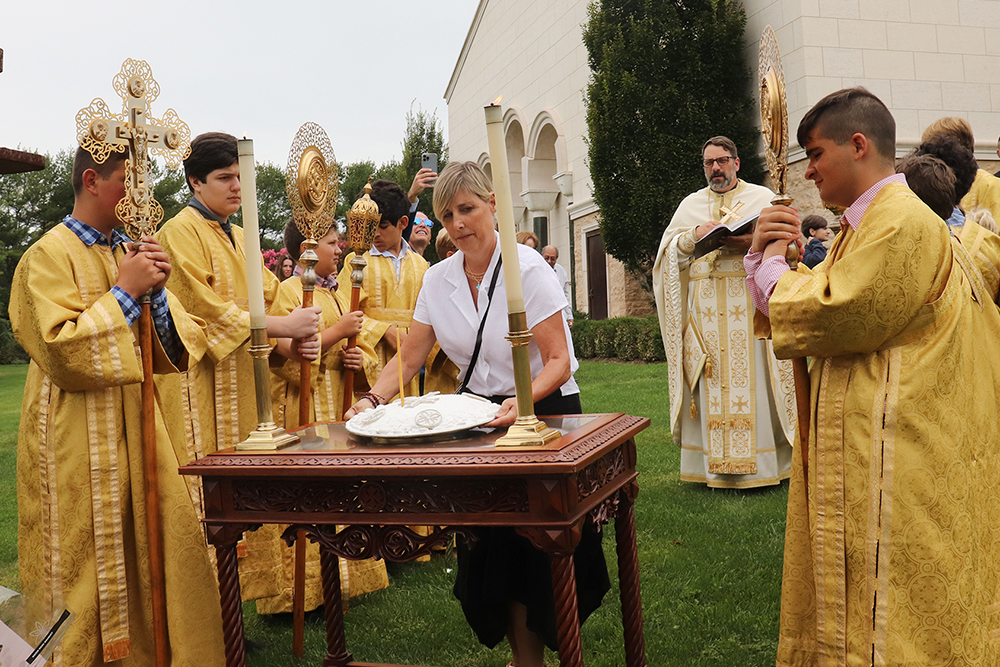
Dr. Lisa Liberatore, center, carries a Koliva, which is prepared for memorial services in Orthodox churches and consists of boiled wheat, powdered sugar and almonds, during a service at Dormition of the Virgin Mary Greek Orthodox Church of the Hamptons in Southampton, New York, on Sept. 11, 2022. RNS photo by Adelle M. Banks
Lazarakis said the congregation has embraced her mission of “autism acceptance.” More than 125 people were in attendance on “Family Day” on Sept. 11, listening as Lazarakis chanted prayers, joining in the Lord’s Prayer and hearing the harmony of the choir in the balcony waft over the sanctuary with vibrantly colored icons. Just as they would most Sundays, the housemates sat in the pews or served on the altar.
In an earlier interview, the priest cited Jesus’ words in the Gospel of Matthew about unconditional mercy and love for “the least of these my brethren” as a guide for his church’s relationship with US Autism Homes.
Melina Angelson, a US Autism Homes trustee and former restaurant owner, volunteers in the church’s kitchen, teaching the housemates how to mix batter uniformly and the correct technique for using a vegetable peeler. She sees the programming as an extension of what the church should be doing, just as it offers space for Alcoholics Anonymous meetings and Cub Scout events.
“The church building is there for this very reason,” she said. “The church is there for the community, and these guys are part of our community.”
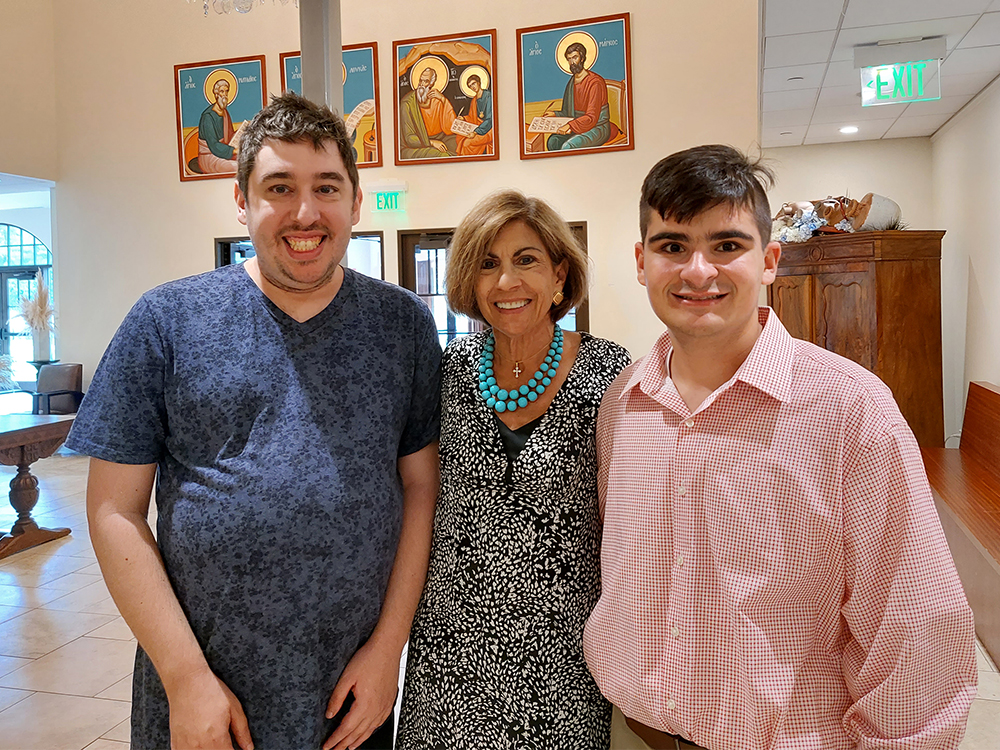
Anthony Giangiobbe, from left, Melina Angelson and Dimitri Donus pose together at Dormition of the Virgin Mary Greek Orthodox Church of the Hamptons in Southampton, New York, on Sept. 11, 2022. RNS photo by Adelle M. Banks
Some parents of the houses’ residents said that the church is more accepting than congregations that they tried — and stopped attending — where they got looks when their children made noises or couldn’t sit still during a service. At Dormition of the Virgin Mary, Liberatore’s son served as an acolyte but at one point could be seen walking outside the church, followed by Loveday Okafor, a subdeacon and live-in caregiver.
Vasso and Anthony Lazanas came to their church on a recent Sunday with their son Elias, 26, who had spent the night at US Autism Homes’ newer house.
“Most of our time is right now to cater to Elias to make him happy ’cause that makes us happy, too, but it was nice yesterday to have some time on our own,” said his father, who said he and his wife had gone to the beach and had dinner out.
Elias’ mother said he had begun a trial of three weeks in the second house, learning to live there without the involvement of his family. “We always wanted that for Elias,” she said.
Charlie Massimo said Steven, one of his two sons with autism, has been spending the last few months getting to know the people he’ll be living with in the second residence.
“Since they were diagnosed and I kind of understood what autism meant and it was lifelong, probably the No. 1 worry I had was: What happens when I’m no longer here to care for them?” said Massimo, who described himself as a believer in God who wants his son to attend the church services, in a phone interview.
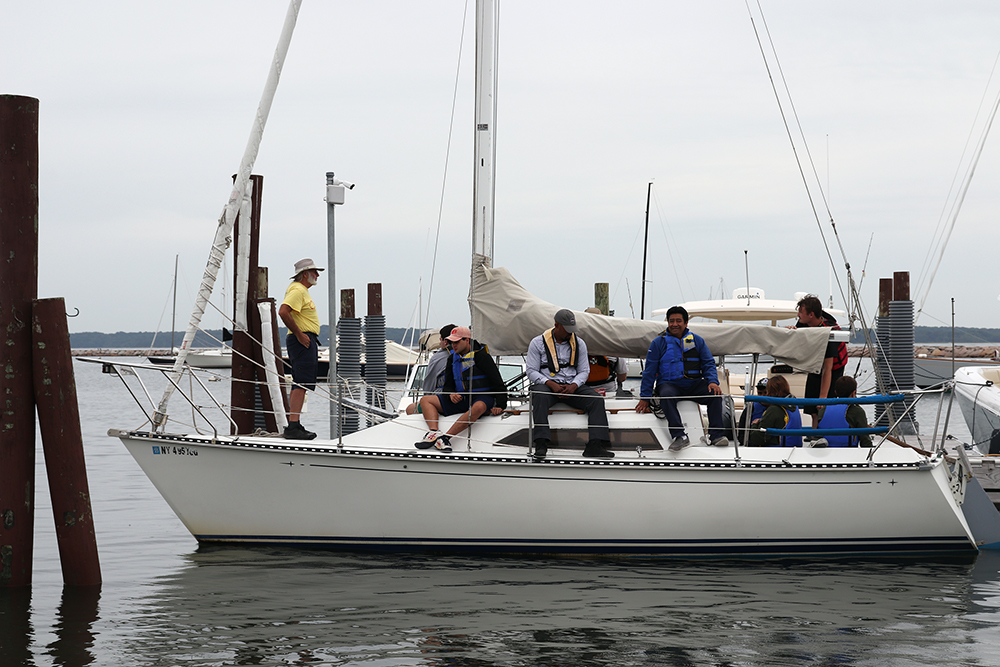
US Autism Homes residents and staff depart on a boat trip in Sag Harbor, New York, on Sept. 11, 2022. RNS photo by Adelle M. Banks
Massimo appreciates this new opportunity for his son not only as a parent but as an advocate who works as a wealth manager helping other families plan for the future of their children with autism.
“They look at my son as an individual,” said Massimo, who also is a member of New York state’s Autism Spectrum Disorders Advisory Board, adding their goals for the housemates is “how can we expand their life in the greatest capacity or get the most out of them so that they can live a fulfilling life.”
Dimitri Donus, who cleans windows at the church and the pool at the house and wants to be a cake decorator someday, said his new life has given him a second family, at home and at the church.
“There is love everywhere,” he said.
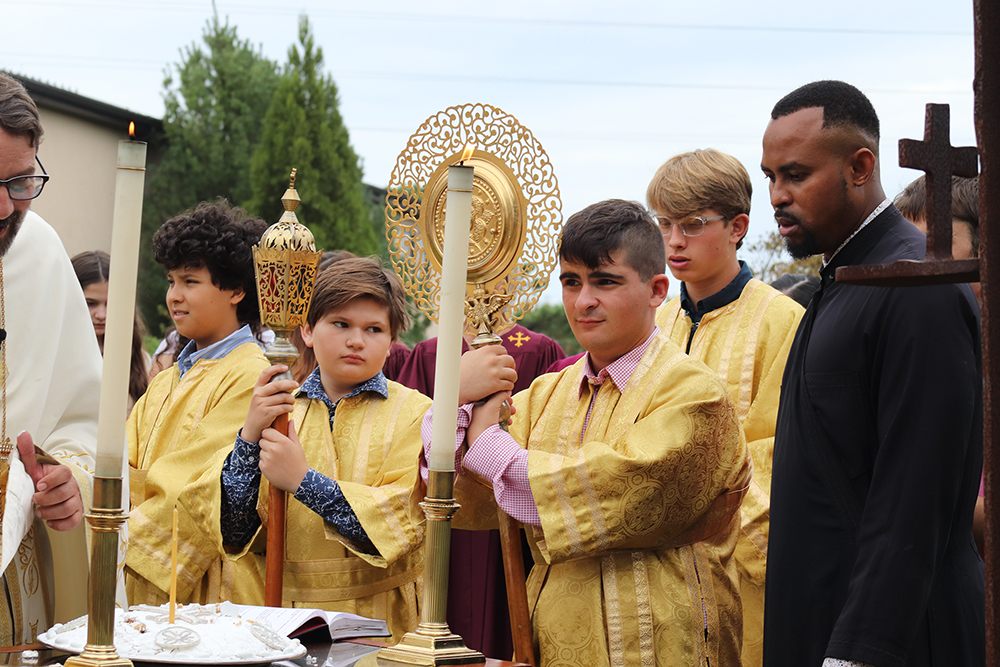
Dimitri Donus, second from right, serves as an acolyte during a service at Dormition of the Virgin Mary Greek Orthodox Church of the Hamptons in Southampton, New York, on Sept. 11, 2022. RNS photo by Adelle M. Banks
RELATED: Having autism makes finding a spiritual community difficult. Here are some ways to help.
